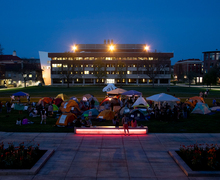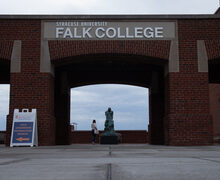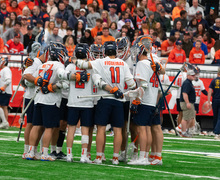Engineering dean J. Cole Smith pushes creativity, social impact in research
Corey Henry | Photo Editor
Smith previously served as associate provost for academic initiatives and chair of the Department of Industrial Engineering at Clemson University.
Dean J. Cole Smith wasn’t looking for another job when the opportunity to lead a college at Syracuse University crossed his path.
Smith previously served as associate provost for academic initiatives at Clemson University. A search firm reached out to him about the SU position. Smith drafted a note declining the possible position, but the firm said something that made him pause.
“I know you’re not interested in other jobs right now,” they said. “But I thought you might like this one.”
In the end, Smith never hit send on his message, and on Oct. 1, he took on the role of dean of SU’s College of Engineering and Computer Science. His vision for his new school is twofold.
“Where people think of the best engineering universities in the world, I want them to have Syracuse on their mind,” he said. “But I also want us to be differentiated in our creativity and our application to problems of societal need.”
It was the size of the college that first stood out to Smith when considering the dean position, he said. About 1,500 undergraduate students are enrolled at SU’s engineering school — a smaller number than other engineering colleges, Smith said.
The smaller population will allow Smith to get to know the faculty and students around him, he said. Half of his job will be external facing, including professional development and helping to advance the university. The other half will be internal: mentoring and interacting with students.
“It’s the perfect balance,” he said.
Smith’s appointment marked the end of a months-long search to find a permanent replacement for former Dean Teresa Dahlberg, who stepped down to become vice chancellor and provost at Texas Christian University. His transition to SU has been busy, guided by two main focuses.
The university is adding faculty through its Cluster Hires Initiative, made of multidisciplinary groups that combine people with similar research interests. These hires are an immediate focus of his.
“It matters deeply whom we hire right now,” Smith said. “And it matters with whom we collaborate across campus.”
The transition’s other focus is the college culture, he said. Many people hear “engineering” or “computer science” and think of cybersecurity, video games or programming, he said. While Smith does not want to quash this image completely, he also wants to broaden it to a larger reach.
People need to see the college’s sciences as vehicles that can provide solutions for the rest of the world, Smith said. Emphasizing the college’s ability to solve problems that others may not have considered yet will draw more people to the school, he said.
“There’s no better way to recruit a broad set of people than by saying ‘you can help your fellow person out there,’” Smith said.
Anand Gramopadhye, dean of Clemson’s College of Engineering, Computing and Applied Sciences, recruited Smith as department chair. Smith’s dedication to students stood out, he said.
Under Smith’s leadership, the Department of Industrial Engineering ranking increased from the mid-30s to No. 24 nationally. Smith made the jump possible by supporting the right talent, recruiting and mentoring faculty members and making sure students left the program as successful graduates, Gramopadhye said.
Atta girl, Di!! Proud to be be your co-author. Soon :-). https://t.co/Qt9Zvs6aNF
— Cole Smith (@j_cole_smith) October 24, 2019
The department’s undergraduate population also grew by 50% over four years while Smith was there.
“We were very much focused on increasing our research productivity, but there was absolutely no way that we were going to sacrifice our relationship with our student body at that expense,” said Kevin Taaffe, a professor of industrial engineering at Clemson.
Prior to his appointment as associate provost at Clemson, Smith led the university’s Department of Industrial Engineering. He has also worked at the University of Florida and the University of Arizona.
Improving research capabilities involves understanding faculty priorities, Smith said. The college can support faculty throughout the research proposal process — finding the opportunity for proposals, writing those proposals and getting feedback, he said.
Support also includes encouraging people to try “really big” ideas that might fail. Even if a proposal is denied, it is still helping the college’s overall proposal efforts, he said.
For engineering and computer science students, Smith wants to make sure the college is paying attention to a wide variety of concerns.
Right now, the diversity and representation of the college doesn’t match the population of New York state or the country. The college is missing diverse role models for students, but it’s also missing creative ideas and different perspectives, Smith said.
The college has been proactive in trying to create a better environment, but it is up to Smith to make sure there is continued follow-through on those efforts, he said. He wants to get involved with organizations that promote underrepresented scholars and provide pathways for those scholars, he said.
When Di Nguyen, a Clemson doctoral student, was an undergraduate, she was part of a group that worked to improve the quality of the Department of Industrial Engineering. The group was just a bunch of undergraduate students, but Smith was happy to meet with them — sometimes at 7 a.m., she said.
Even after moving to Syracuse, Smith still serves as her doctoral advisor. Though he’s more than 850 miles away, Nguyen said it’s almost like he’s still at Clemson.
Smith, a Clemson alumnus, does continue to return to his old home. His family still lives there, and one visit back found Smith in the front section of a busy restaurant with his wife and youngest daughter.
The opportunity for leadership at SU was something he couldn’t pass up, but he hated leaving the people at Clemson. While at the restaurant, so many people who passed him called out his name that his daughter must have thought he was a rock star, Smith said.
Smith is intentional when interacting with others, said Mary Beth Kurz, associate department chair of Clemson’s Department of Industrial Engineering.
Kurz has known Smith for about 20 years. When she was a faculty member at Clemson, before Smith worked there, he and his family went to a Clemson football game. He invited Kurz along, who he first met at a conference. It was the first time Kurz had ever been to a Clemson tailgate, she said.
Now at SU, Smith wants students to know they belong at the College of Engineering and Computer Science, he said. Students should stop Smith in the hallway and introduce themselves or say hello when they see him out and about, he said.
Looking three, four, five years into the future, Smith has a vision of what the college could be: He looks forward to seeing the school grow. To improving the quality of life for faculty and staff. To promoting the college’s social impact.
“When I see a student that has a career opportunity that maybe she or he never would have had four years ago because of something that my team and I developed,” Smith said, “you can’t help but smile.”
Published on October 30, 2019 at 10:15 pm
Contact India: [email protected]




